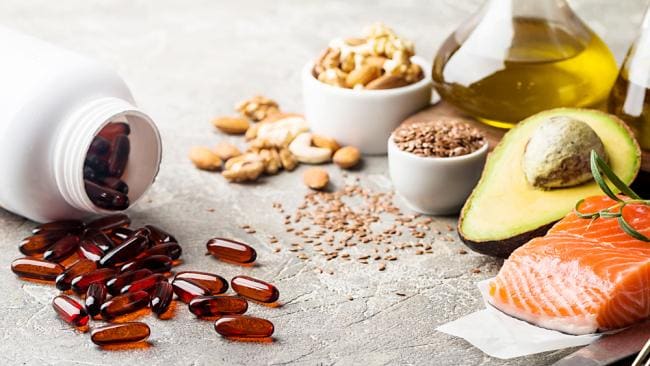Beneficial effects of probiotic combination with omega-3 fatty acids in NAFLD: a randomized clinical study

Abstract
Background:
The manipulation of gut microbiota via administration of probiotics has been proposed as a potential strategy for the treatment of non-alcoholic fatty liver disease (NAFLD). Hence, we performed a double-blind single center randomized placebo-controlled trial (RCT) to evaluate the efficacy of coadministration of probiotics with omega-3 vs. placebo in type-2 diabetic patients with NAFLD.
Methods:
A total of 48 patients met the criteria for inclusion. They were randomly assigned to receive "Symbiter Omega" combination of probiotic biomass supplemented with flax and wheat germ oil (250 mg of each, concentration of omega-3 fatty acids 1-5%) or placebo for 8-weeks. The primary main outcomes were the change in fatty liver index (FLI) and liver stiffness (LS) measured by Shear Wave Elastography (SWE). Secondary outcomes were the changes in transaminases level, serum lipids and cytokines levels.
Results:
In probiotic-omega group, FLI significantly decreased from 83.53±2.60 to 76.26±2.96 (P<0.001) while no significant changes were observed in the placebo group (82.86±2.45 to 81.09±2.84; P=0.156). Changes of LS in both groups were insignificant. Analysis of secondary outcomes showed that the coadministration of probiotics with omega-3 lead to significant reduction of serum gamma-glutamyl transpeptidase, triglycerides, and total cholesterol. Chronic systemic inflammatory markers after intervention decrease significantly only in Symbiter Omega group: IL-1β (P=0.029), TNF-α (P<0.001), IL-8 (P=0.029), IL-6 (P=0.003), and INF-γ (P=0.016).
Conclusions:
Coadministration of a live multi-strain probiotic mixture with omega-3 fatty acids once daily for 8 weeks to patients with NAFLD can reduce liver fat, improve serum lipids, metabolic profile, and reduce chronic systemic inflammatory state.
https://pubmed.ncbi.nlm.nih.gov/30221912/
Background:
The manipulation of gut microbiota via administration of probiotics has been proposed as a potential strategy for the treatment of non-alcoholic fatty liver disease (NAFLD). Hence, we performed a double-blind single center randomized placebo-controlled trial (RCT) to evaluate the efficacy of coadministration of probiotics with omega-3 vs. placebo in type-2 diabetic patients with NAFLD.
Methods:
A total of 48 patients met the criteria for inclusion. They were randomly assigned to receive "Symbiter Omega" combination of probiotic biomass supplemented with flax and wheat germ oil (250 mg of each, concentration of omega-3 fatty acids 1-5%) or placebo for 8-weeks. The primary main outcomes were the change in fatty liver index (FLI) and liver stiffness (LS) measured by Shear Wave Elastography (SWE). Secondary outcomes were the changes in transaminases level, serum lipids and cytokines levels.
Results:
In probiotic-omega group, FLI significantly decreased from 83.53±2.60 to 76.26±2.96 (P<0.001) while no significant changes were observed in the placebo group (82.86±2.45 to 81.09±2.84; P=0.156). Changes of LS in both groups were insignificant. Analysis of secondary outcomes showed that the coadministration of probiotics with omega-3 lead to significant reduction of serum gamma-glutamyl transpeptidase, triglycerides, and total cholesterol. Chronic systemic inflammatory markers after intervention decrease significantly only in Symbiter Omega group: IL-1β (P=0.029), TNF-α (P<0.001), IL-8 (P=0.029), IL-6 (P=0.003), and INF-γ (P=0.016).
Conclusions:
Coadministration of a live multi-strain probiotic mixture with omega-3 fatty acids once daily for 8 weeks to patients with NAFLD can reduce liver fat, improve serum lipids, metabolic profile, and reduce chronic systemic inflammatory state.
https://pubmed.ncbi.nlm.nih.gov/30221912/

